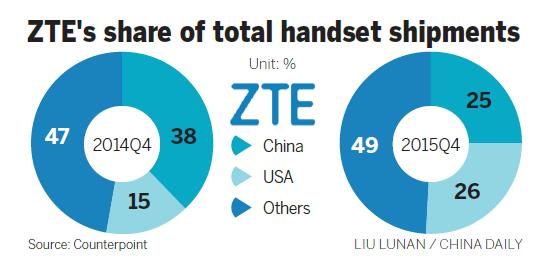Smartphone maker moves swiftly to shore up vital market
ZTE Corp, a Chinese telecom equipment and smartphone maker, has reshuffled its top executive team, just weeks after the United States sanctioned the company for alleged export violations.
Shi Lirong, who has led ZTE's overseas expansion as president and chairman since 2010, is stepping down, to be replaced by Zhao Xianming, its chief technology officer, the Shenzhen-based company said in a statement.
The company has also appointed seven new executive vice-presidents, including Zeng Xuezhong, head of handset businesses.
The changing of the guard comes after the US Commerce Department announced it was blocking US companies from selling components to ZTE, claiming the Chinese company sold prohibited items to Iran.
The US government has since said it would ease the restrictions until the end of June and could further ease them if ZTE cooperated in "resolving the matter".
"The new management team will continue work on innovation and global expansion, and will follow the highest-level international business principles," said the statement.
Shares in ZTE, traded in the Shenzhen Stock Exchange, have been suspended since early March. The company is due to announce full-year results on Wednesday.
Analysts suggested the US sanctions triggered Shi's departure, although the company insisted the matters are not related.
James Yan, research director at Counterpoint Technology Market Research, said replacing Shi was a right call for ZTE because the company cannot afford to miss out on the US as a key growth opportunity.
"The core management team in the US is intact, which is a good thing for ZTE because they still have the know-how to handle everyday operations," Yan said.
Milly Xiang, a telecom analyst with research firm International Data Corp, also said the management changes will have limited impact on ZTE's strategies, most of which were drawn up as early as in 2014.
"I don't think (the reshuffle) will slow down ZTE's global expansion, especially when the company is seeking to outshine its competitors by migrating to post-4G telecom technology and the Internet of Things market," said Xiang.



















































